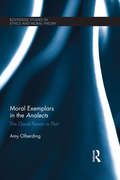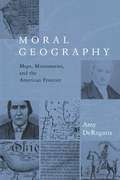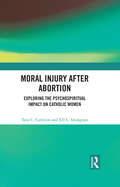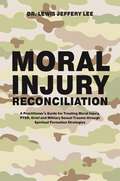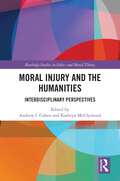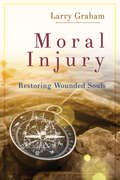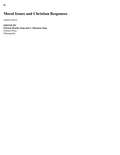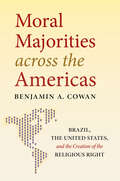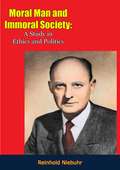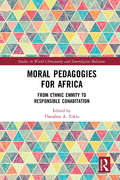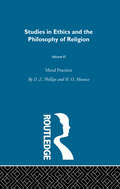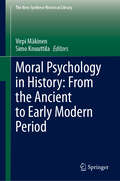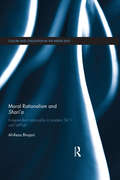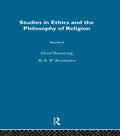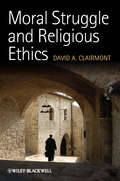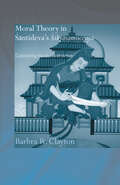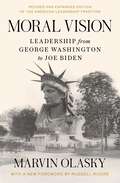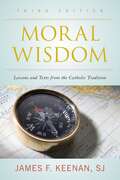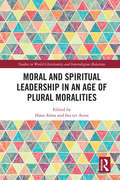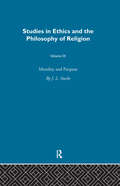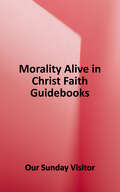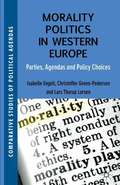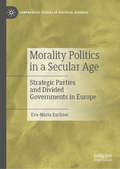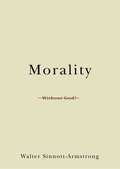- Table View
- List View
Moral Exemplars in the Analects: The Good Person is That (Routledge Studies in Ethics and Moral Theory)
by Amy OlberdingIn this study, Olberding proposes a new theoretical model for reading the Analects. Her thesis is that the moral sensibility of the text derives from an effort to conceptually capture and articulate the features seen in exemplars, exemplars that are identified and admired pre-theoretically and thus prior to any conceptual criteria for virtue. Put simply, Olberding proposes an "origins myth" in which Confucius, already and prior to his philosophizing knows whom he judges to be virtuous. The work we see him and the Analects'authors pursuing is their effort to explain in an organized, generalized, and abstract way why pre-theoretically identified exemplars are virtuous. Moral reasoning here begins with people and with inchoate experiences of admiration for them. The conceptual work of the text reflects the attempt to analyze such people and parse such experiences in order to distill abstract qualities that account for virtue and can guide emulation.
Moral Geography: Maps, Missionaries, and the American Frontier (Religion and American Culture)
by Amy DeRogatisMoral Geography traces the development of a moral basis for American expansionism, as Protestant missionaries, using biblical language and metaphors, imaginatively conjoined the cultivation of souls with the cultivation of land and made space sacred. While the political implications of the mapping of American expansion have been much studied, this is the first major study of the close and complex relationship between mapping and missionizing on the American frontier. Moral Geography provides a fresh approach to understanding nineteenth-century Protestant home missions in Ohio's Western Reserve. Through the use of maps, letters, religious tracts, travel narratives, and geographical texts, Amy DeRogatis recovers the struggles of settlers, land surveyors, missionaries, and geographers as they sought to reconcile their hopes and expectations for a Promised Land with the realities of life on the early American frontier.
Moral Injury After Abortion: Exploring the Psychospiritual Impact on Catholic Women
by Tara C. Carleton Jill L. SnodgrassMoral Injury After Abortion delves deeply into the psychospiritual responses that some women experience when an abortive act conflicts with their moral beliefs and values. The book is grounded in a qualitative, phenomenological study that examined the lived experiences of thirty Christian women after abortion. The study participants’ voices are woven throughout the book in a way that offers the reader a narrative understanding of their experiences and a thick description of the psychospiritual impact of moral injury after abortion. The book provides mental health scholars and professionals with strategies for assessing for moral injury experiences among women post-abortion as well as a guide for addressing the spiritual and psychological impact of post-abortive moral injury.
Moral Injury Reconciliation: A Practitioner's Guide For Treating Moral Injury, Ptsd, Grief And Military Sexual Trauma Through Spiritual Formation Strategies
by Lewis Jeff LeeCreated to counteract the spiritual imbalance that MI can cause, the Moral Injury Reconciliation (MIR) methodology is a 9-week, 3-phased spiritual care treatment, for Veteran and family transformation. This book presents this methodology as a trans-diagnostic approach for practitioners working with clients with MI, PTSD, grief and military sexual trauma. Using the language of reconciliation and spiritual transformation in the context of working therapeutically with Veterans, the author shows how chaplains and others involved in spiritual care can work on the assessment and therapy of those who have experienced MI during their combat experience. It reconciles past trauma, creates a focused 'here-and-now' present and anticipates a hopeful future through spiritual awareness, communication skills and altruism.
Moral Injury and the Humanities: Interdisciplinary Perspectives (Routledge Studies in Ethics and Moral Theory)
by Andrew I. CohenThis book brings together leading interdisciplinary scholars to broaden and deepen the conversation about moral injury. In the original chapters, the contributors present new research to show how the humanities are crucial for understanding the expressions, meaning, and significance of moral injury. Moral injury is the disorientation we suffer when we are complicit in some moral transgression. Most existing works address moral injury from a clinical or neuroscientific perspective. The chapters in this volume show how the humanities are crucial for understanding the meaning and significance of moral injury as well as suggesting how to grapple with its lived challenges. The chapters address the conceptual, sociological, historical, and ritualistic dimensions of moral injury across three thematic sections. Section 1 explores how tools of the humanities provide new lenses for understanding conceptual and genealogical themes about moral injury. Section 2 highlights the experiences of moral injury in combat soldiers, law enforcement, and noncombatants such as photojournalists. These chapters examine the power and limits to theorizing moral phenomena by appeals to lived experience. Section 3 considers how humanistic inquiry illuminates important dimensions of the aftermath of moral injury beyond the scope of clinical research. These chapters consider how ritual, relationship repair, and atonement might shape the ways people navigate moral injury and consider how such responses shape our understanding of what we owe to one another. Moral Injury and the Humanities: Interdisciplinary Perspectives is an essential resource for researchers and advanced students in philosophy, religious studies, literature, journalism, and the arts who are interested in moral injury.
Moral Injury: Restoring Wounded Souls
by Larry Kent GrahamIf we can share our burdens, we can bear them. If we can bear them, we can change the circumstances that brought them about. In a world where anything goes, people have a hard time deciding what is right and what is wrong. Pastors have a hard time helping people discern right and wrong because the church’s theological language of sin and redemption have so little currency and even less cultural relevancy. How can pastors help people deal with their feelings of guilt, shame, and responsibility when most many people don’t believe in sin and have a limited or "flexible" moral framework? People need help assessing moral alternatives, reconciling what they have done with what they think is right, recovering from burdens of guilt and shame, and imagining moral options to serve the common good. It is the call of pastors, chaplains, and other spiritual caregivers to help people move from moral injury to pardon and, eventually, to sustained recovery and resilience—in essence this book will help pastors reclaim their pastoral tasks of soul care and moral guidance without succumbing to the temptation of moralizing.Using vivid examples, the author will look at how various religious communities seek, promote, and achieve personal wholeness and realize the common good. This understanding will inform pastors, so that they can help their congregants and communities become vital agents in a sea of, often, conflicting moral voices. The book will provide resources for identifying core assets, and how to assess the various codes and moral claims interacting within the kaleidoscopic climate in which we live. Drawing upon neuroscience, narrative spirituality, and collaborative communal engagement, the author gives tools to aid pastors, chaplains, and spiritual caregivers ameliorate the distress caused by dissonance and resulting in moral injury. The book will also provide resources for helping people bear the burdens of moral responsibility and for navigating the sometimes unbearable consequences of particular moral actions. The author concludes with suggestions for helping people suffering from injury to their integrity from misdeeds they endure, either as a result of their own actions or from those actions of others, move toward sustained resilience and more mature moral imagination."There is no better guide, or collaborative partner, for navigating the moral territory of post-traumatic living than Larry Graham. In Moral Injury: Restoring Wounds Souls, Graham sounds a clarion call for religious leaders to cultivate habits of mind and body to meet the complex situations of our day. Rather than offering a birds-eye-view of the moral terrain, Graham invites readers to feel the earth under their feet and attune themselves to the climate of their moral environments. With his careful definitional work and theological acumen, he revivifies theological ethics for progressive Christians. [And beyond this audience, Graham displays the importance of theology in contemporary discussions of moral injury.]" – Shelly Rambo, Associate Professor of Theology, Boston University School of Theology "Larry Graham has created an extraordinary workbook for moral resiliency and healing. He restores hope for the excruciating pains of a broken conscience. A treasure house of timely and practical applications sure to enrich pastoral conversations!" - Paul W. Dodd, Chaplain (Colonel), U.S. Army (Retired)"This book is a must-read if we care about recovery from moral injury, not just in the wake of immediate trauma, but also in historical legacies that haunt us. Larry Graham illuminates how questions of God can be addressed in that process with grace and compassion, and he shows, via the experiences of people from a variety of cultures and faiths, how moral injury can be healed." - Rev. Rita Nakashima Brock, Ph.D., Senior Vice-President for Moral Injury Programs at Volunteers of America. She is the former Research Professor of Religion and Culture and Director of the Soul Repair Center at Brite Divinity School, Texas Christian University, Fort Worth, TX
Moral Issues and Christian Responses
by Patricia Beattie Jung L. Shannon JungPreviously published by Cengage/Wadsworth, this popular anthology for the study of Christian ethics has been a mainstay of undergraduate courses for nearly thirty years. Shannon and Patricia Jung provide an introduction to contemporary moral issues from decidedly, yet diverse, Christian moral perspectives. <p><p>The anthology intentionally seeks a range of voices to produce a kind of “point/counterpoint” discussion of the ethical issue. Among the classic issues considered are: sexuality and reproductive rights, prejudice, biomedical ethics, the environment, immigration, terrorism, war, and globalization. New issues include: development ethics, personal finance and consumerism, workplace ethics, health care, and citizenship.
Moral Majorities across the Americas: Brazil, the United States, and the Creation of the Religious Right
by Benjamin A. CowanThis new history of the Christian right does not stop at national or religious boundaries. Benjamin A. Cowan chronicles the advent of a hemispheric religious movement whose current power and influence make headlines and generate no small amount of shock in Brazil and the United States. These two countries, Cowan argues, played host to the principal activists and institutions who collaboratively fashioned the ascendant religious conservatism of the late twentieth century. Cowan not only unearths the deep historical connections between Brazilian and U.S. religious conservatives but also proves just how essential Brazilian thinkers, activists, and institutions were to engendering right-wing political power in the Americas.Cowan shows that both Protestant and Catholic religious warriors began to commune in the 1930s around a passionate aversion to mainstream ecumenicalism and moderate political ideas. Brazilian intellectuals, politicians, religious leaders, and captains of industry worked with partners at home and in the United States to build a united right. Together, activists engaged in a series of reactionary theological discussions. Their transnational, transdenominational platform fostered a sense of common cause and allowed them to develop a series of strategies that pushed once marginal ideas to the center of public discourse, reshaped religious demographics, and effected a rightward shift in politics across two continents.
Moral Man and Immoral Society: A Study in Ethics and Politics (Library of Theological Ethics Ser.)
by Reinhold NiebuhrMoral Man and Immoral Society, first published in 1932, is Reinhold Niebuhr’s important study in ethics and politics. Forthright and realistic, it discussed the inevitability of social conflict, the brutal behaviour of human collectives of every sort, the inability of rationalists and social scientists to even imagine the realities of collective power, and, ultimately, how individual morality can overcome social immorality.“Every thinking Christian must squarely face the major thesis of this book, or confess the impotence of his faith for a day when the dawn is lowering red.”—The Christian Century“No one can read it without gaining great value.”—Annals of the American Academy of Political and Social Science
Moral Pedagogies for Africa: From Ethnic Enmity to Responsible Cohabitation (Studies in World Christianity and Interreligious Relations)
by Theodros A. TekluThis volume engages with issues of moral responsibility and multiethnic co-existence in the context of contemporary Africa. Post-colonial African states are by and large ethnically diverse. Constructively managing ethnic diversity, however, has always been a challenge to these states, which often fail to be democratic and all-inclusive. As a result, ethnic enmity and conflicts that obliterate bonds of togetherness between ethnic communities have been rampant throughout the continent. In dialogue with Africa’s cultural and religious assets, this interdisciplinary multi-authored book aims at articulating the need to interpret past and present ethnic hostilities in Africa, and generating moral resources of togetherness to foster a social pedagogy of responsible cohabitation for Africans. The chapters of this volume, categorized into two parts, are framed according to these two niches.
Moral Practices Vol 6
by D.Z. Phillips H.O. MounceThis is Volume VI of nine in a collection of studies in Ethics and the Philosophy of Religion. Originally published in 1970, this volume looks at moral practices and the question which has puzzled philosophers: whether any value judgement can follow logically from the facts, can follow in such a way that someone who assents to the facts is bound in logic to assent also to the value judgement based upon them.
Moral Psychology in History: From the Ancient to Early Modern Period (The New Synthese Historical Library #79)
by Simo Knuuttila Virpi MäkinenThis book provides a comprehensive study of major issues of moral psychology throughout history, from ancient to early modern philosophy. The volume focuses primarily on the Western history of philosophy but also deals with Jewish and Islamic heritage. The Introduction chapter lays out the historical background in broad strokes, giving the reader the “lay of the land” when it comes to the terms of analysis and their overall development within the Western tradition of moral psychology. The book continues by studying and analyzing moral anthropology, moral agency and motivation, virtues and social and political commitments, taking a thematic approach in a specific time-period and focus on the most unique and/or fruitful discussions about a particular historically situated discussion when it comes to thinking about questions and/or ‘problems’ in the field of moral psychology. Aimed at both a layman and academic audience, this book is of great interest to a broad readership.
Moral Rationalism and Shari'a: Independent rationality in modern Shi'i usul al-Fiqh (Culture and Civilization in the Middle East)
by Ali-Reza BhojaniMoral Rationalism and Sharī'a is the first attempt at outlining the scope for a theological reading of Sharī'a, based on a critical examination of why 'Adliyya theological ethics have not significantly impacted Shī'ī readings of Sharī'a. Within Shī'ī works of Sharī 'a legal theory (usūl al-fiqh) there is a theoretical space for reason as an independent source of normativity alongside the Qur’ān and the Prophetic tradition. The position holds that humans are capable of understanding moral values independently of revelation. Describing themselves as 'Adliyya (literally the people of Justice), this allows the Shī 'a, who describe themselves as 'Adiliyya (literally, the People of Justice), to attribute a substantive rational conception of justice to God, both in terms of His actions and His regulative instructions. Despite the Shī'ī adoption of this moral rationalism, independent judgments of rational morality play little or no role in the actual inference of Sharī 'a norms within mainstream contemporary Shī'ī thought. Through a close examination of the notion of independent rationality as a source in modern Shī'ī usūl al-fiqh, the obstacles preventing this moral rationalism from impacting the understanding of Sharī 'a are shown to be purely epistemic. In line with the ‘emic’ (insider) approach adopted, these epistemic obstacles are revisited identifying the scope for allowing a reading of Sharī'a that is consistent with the fundamental moral rationalism of Shī'ī thought. It is argued that judgments of rational morality, even when not definitively certain, cannot be ignored in the face of the apparent meaning of texts that are themselves also not certain. An 'Adliyya reading of Sharī'a demands that the strength of independent rational evidence be reconciled against the strength of any other apparently conflicting evidence, such that independent judgments of rational morality act as a condition for the validity of precepts attributed to a just and moral God.
Moral Reasoning Vol 2 (Studies In Ethics And The Philosophy Of Religion)
by R. W. BeardsmoreFirst published in 2003. Routledge is an imprint of Taylor & Francis, an informa company.
Moral Struggle and Religious Ethics
by David A. ClairmontMoral Struggle and Religious Ethics offers a comparative discussion of the challenges of living a moral religious life. This is illustrated with a study of two key thinkers, Bonaventure and Buddhaghosa, who influenced the development of moral thinking in Christianity and Buddhism respectively.Provides an important and original contribution to the comparative study and practice of religious ethicsMoves away from a comparison of theories by discussing the shared human problem of moral weaknessOffers an fresh approach with a comparison of the understanding of the problem of moral weakness between the two key thinkers, Bonaventure and BuddhaghosaWritten by a highly respected academic in the dynamic and fast-growing field of comparative religious ethics
Moral Theory in Santideva's Siksasamuccaya: Cultivating the Fruits of Virtue (Routledge Critical Studies in Buddhism)
by Barbra R. ClaytonThis important text analyzes the moral theory of the seventh century Indian Mahayana master, Santideva, author of the well-known religious poem, the Bodhicaryavatara (Entering the Path of Enlightenment) as well as the significant, but relatively overlooked, Siksasamuccaya (Compendium of Teachings). With particular focus on the Siksasamuccaya, this book uses original translations and critical analysis in order to answer the question: How would Santideva’s ethics be understood in terms of Western moral theory? Santideva’s ethical presuppositions and moral reasoning are illuminated by analyzing his key moral terms and comparing them to other Buddhist principles. By focusing on a neglected Buddhist Sanskrit text by a major Mahayana figure, Barbra R. Clayton helps to redress a significant imbalance in the scholarship on Buddhist ethics, which has - up to now - focused primarily on the ethics of the Pali literature as interpreted in the Theravada tradition.
Moral Vision: Leadership from George Washington to Joe Biden
by Marvin OlaskyWhat makes a leader truly great? Is it simply a matter of management style and personality? Or is it character that matters most? Moral Visions takes an insightful look into America&’s leaders of the past to answer these questions and demonstrates that values and moral convictions are critical to the strength of a nation.Supposedly, we learn about the candidates for the highest office through a series of tests called &“debates,&” which are instead an exchange of soundbites. We can&’t know whether an aspirant to the presidency has the ability to ask good questions or only a suave or belligerent ability to answer them. Moral Vision is a human-interest introduction to American history through studies of nineteen leaders: presidents, almost presidents, a tycoon, a crusading journalist, and even a leading 19th century abortionist. Its lessons can help voters sort through the candidates in 2024 and beyond by measuring them against previous leaders—none of whom was faultless. It shows how the deepest views often grow out of religious belief and influence political goals, racial prejudices, sexual activities, uses of power, and senses of service. In his 1789 inaugural address, George Washington pledged that &“the foundation for national policy will be laid in the sure and immutable principles of private morality.&” Marvin Olasky shows how 19th-century leaders like Thomas Jefferson, Andrew Jackson, and Grover Cleveland partly upheld and partly ignored that promise, and 20th-century leaders like Woodrow Wilson, John F. Kennedy, and Bill Clinton tried to &“compartmentalize&” the private and the public. An extensively updated version of The American Leadership Tradition, Moral Vision is for anyone tired of today&’s textbook tendencies to submerge the role of individuals as big economic and demographic waves roll in. History is more than statistics, economics, and group identities. Human beings are more than paper boats riding the rainfall into gutters.
Moral Wisdom: Lessons and Texts from the Catholic Tradition
by James F. Keenan SjThis book introduces readers to moral theory through a Catholic lens. In a warm, conversational style, Father Keenan shares a wealth of stories and examples to highlight the resources in the Catholic tradition for developing moral wisdom. Connecting formative influences of the Catholic heritage with themes of love, consciences, sin, and suffering, the book helps readers appreciate what gives meaning to our lives. The third edition has been revised throughout to help the reader better understand how to develop and apply moral wisdom in real life. It features additional examples, as well as new material on the teachings of Pope Francis. Chapters on the Ten Commandments and the teachings of Jesus have been re-worked in light of new scholarship. The book also features a new final chapter, Moral Agency, which addresses making practical decisions based on the lessons and texts from the book. Each chapter includes study questions to help readers further reflect on key themes.
Moral and Spiritual Leadership in an Age of Plural Moralities (Studies in World Christianity and Interreligious Relations)
by Ina Ter Avest Hans AlmaIn crisis situations, such as terror attacks or societal tensions caused by migration, people tend to look for explicit moral and spiritual leadership and are often inclined to vote for so-called 'strong leaders'. Is there a way to resist the temptation of the simplistic solutions that these ‘strong leader’ offer, and instead encourage constructive engagement with the complex demands of our times? This volume utilises relational and dialogical perspectives to examine and address many of the issues surrounding the moral and spiritual guidance articulated in globalizing Western societies. The essays in this collection focus on the concept of plural moralities, understood as divergent visions on what is a 'good life', both in an ethical, aesthetical, existential, and spiritual sense. They explore the political-cultural context and consequences of plural moralities as well as discussing challenges, possibilities, risks, and dangers from the perspective of two promising relational theories: social constructionism and dialogical self theory. The overarching argument is that it is possible to constructively put in nuanced moral and spiritual guidance into complex, plural societies. By choosing a clear theoretical focus on relational approaches to societal challenges, this interdisciplinary book provides both a broad scope and a coherent argument. It will be of great interest to scholars of social and political psychology, leadership and organization, religious studies, and pedagogy.
Morality & Purpose Vol 9
by J. L. StocksFirst published in 2003. Routledge is an imprint of Taylor & Francis, an informa company.
Morality Alive in Christ
by Our Sunday VisitorFaith Guidebooks include six lessons each. Each lesson includes dynamic, interactive teaching strategies, Catholic Social Teaching, and attention to the presence and power of the Holy Spirit. They include relevant life situations and the purposeful use of sacred art and contemporary photos. Text is organized into smaller "chunks" to facilitate reading and understanding. Special features included in every lesson include: Made in Love which responds to the need for youth to understand the beauty and truth of God's gift of sexuality and chaste living; Take on the Mind of Christ which give student practice in discerning how to act with a disciple's conviction to a relevant dilemma; Called to Proclaim which responds to the need young people have to understand and share basic Church teaching with confidence; and The Heart of a Disciple which gives students a glimpse into the personal relationship between God and one of the saints.
Morality Politics in Western Europe
by Christoffer Green-Pedersen Lars Thorup Larsen Isabelle EngeliWhy do some countries have 'Culture Wars' over morality issues such as abortion and same-sex marriage while other countries hardly experience any conflict? This book argues that morality issues only generate major conflicts in political systems with a significant conflict between religious and secular parties.
Morality Politics in a Secular Age: Strategic Parties and Divided Governments in Europe (Comparative Studies of Political Agendas)
by Eva-Maria Euchner"Euchner’s carefully researched and cogently argued study of morality politics in Europe adds an outstanding piece of research to the ever growing literature on religion and politics. Its combination of quantitative and qualitative comparative analysis involving a novel data set and cross-policy perspectives demonstrates persuasively the role of religion as a resource for political action even in secularized societies."—Michael Minkenberg, Viadrina European University, Germany“Building upon the dichotomy between the “secular” and “religious” worlds of European morality politics, Dr. Euchner plumbs the empirical depths of four nations to unearth a compelling theoretical explanation for when value-laden conflicts surface in parliaments with a strong secular-religious party cleavage. This singularly important volume belongs in the institutional libraries and bibliographic collections of every serious student of public policy analysis, especially those of us who focus on morality policy.”—Raymond Tatalovich, Loyola University Chicago, USAThis book introduces a new theoretical framework from which to understand religion and morality politics in Europe. This framework provides a first—and rather provocative—answer to the general debate on how religion influences policy-making processes. Specifically, the book argues that religion is more a strategic resource for political parties than a fundamental normative doctrine shaping political parties’ policy-making behavior in a systematic and coherent way. The framework proposes a mechanism (i.e. wedge issue competition) that can be used to identify and explain the conditions under which issues related to religious values rise and fall in parliaments of the religious world in Europe and what consequences we may expect in terms of policy reforms.
Morality Without God?
by Walter Sinnott-ArmstrongSome argue that atheism must be false, since without God, no values are possible, and thus "everything is permitted." Walter Sinnott-Armstrong argues that God is not only not essential to morality, but that our moral behavior should be utterly independent of religion. He attacks several core ideas: that atheists are inherently immoral people; that any society will sink into chaos if it is becomes too secular; that without morality, we have no reason to be moral; that absolute moral standards require the existence of God; and that without religion, we simply couldn't know what is wrong and what is right. Sinnott-Armstrong brings to bear convincing examples and data, as well as a lucid, elegant, and easy to understand writing style. This book should fit well with the debates raging over issues like evolution and intelligent design, atheism, and religion and public life as an example of a pithy, tightly-constructed argument on an issue of great social importance.
Morality and Masculinity in the Carolingian Empire
by Rachel StoneWhat did it mean to be a Frankish nobleman in an age of reform? How could Carolingian lay nobles maintain their masculinity and their social position, while adhering to new and stricter moral demands by reformers concerning behaviour in war, sexual conduct and the correct use of power? This book explores the complex interaction between Christian moral ideals and social realities, and between religious reformers and the lay political elite they addressed. It uses the numerous texts addressed to a lay audience (including lay mirrors, secular poetry, political polemic, historical writings and legislation) to examine how Biblical and patristic moral ideas were reshaped to become compatible with the realities of noble life in the Carolingian empire. This innovative analysis of Carolingian moral norms demonstrates how gender interacted with political and religious thought to create a distinctive Frankish elite culture, presenting a new picture of early medieval masculinity.
